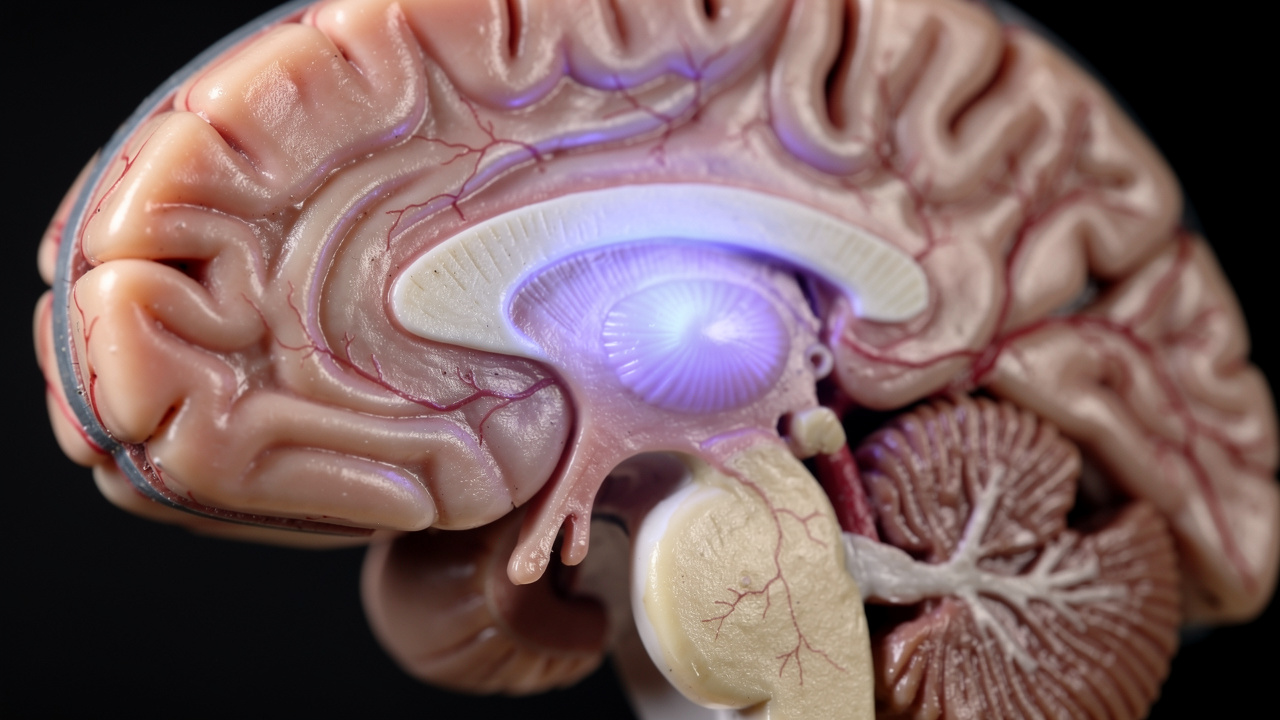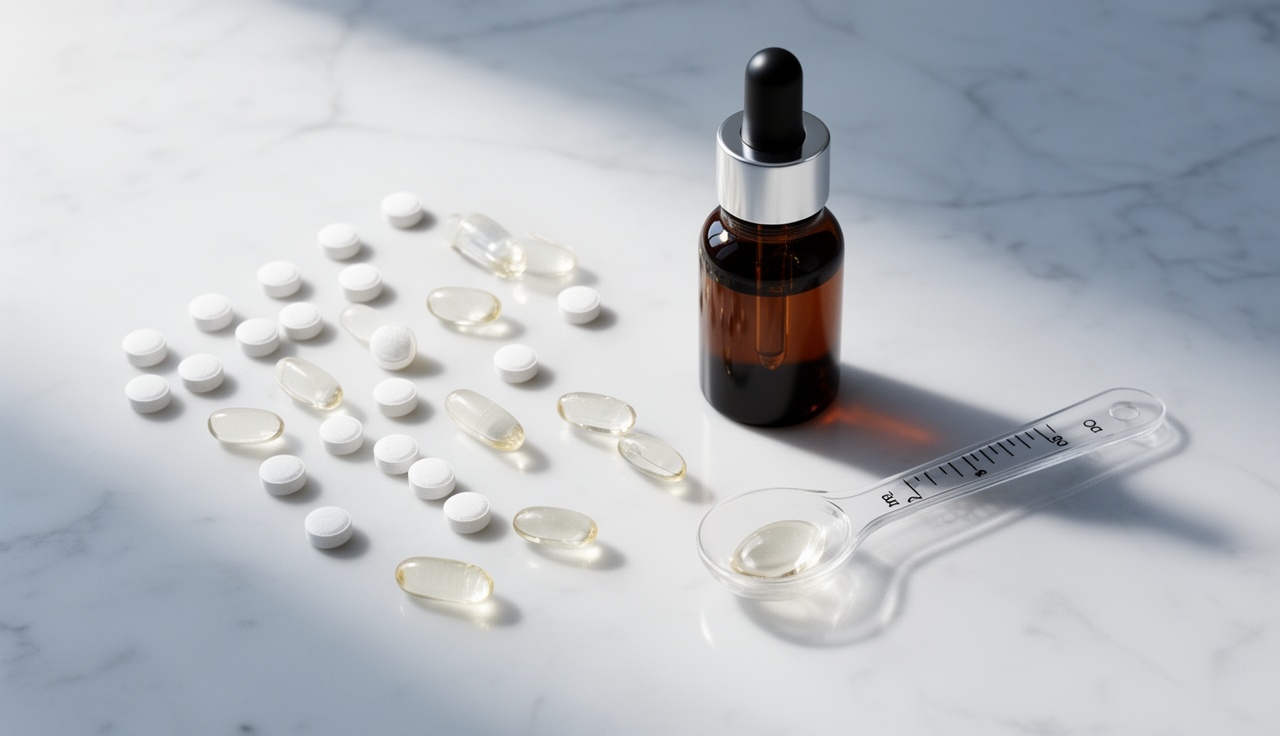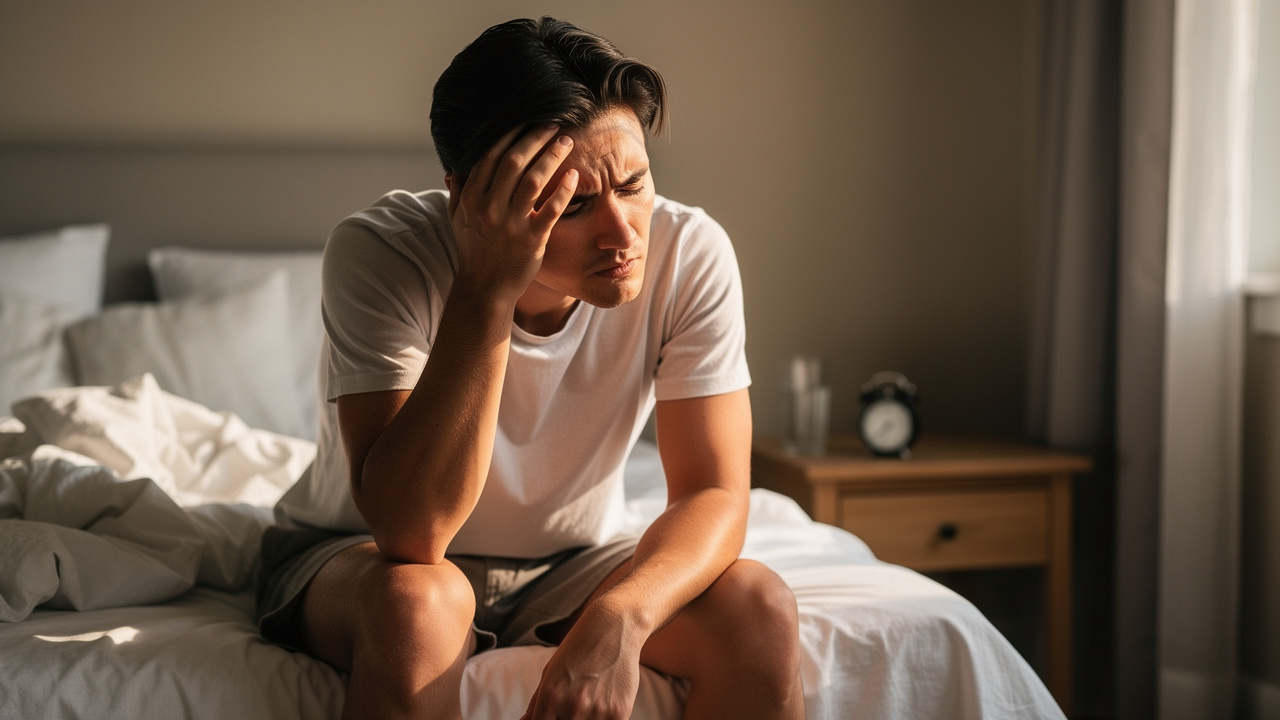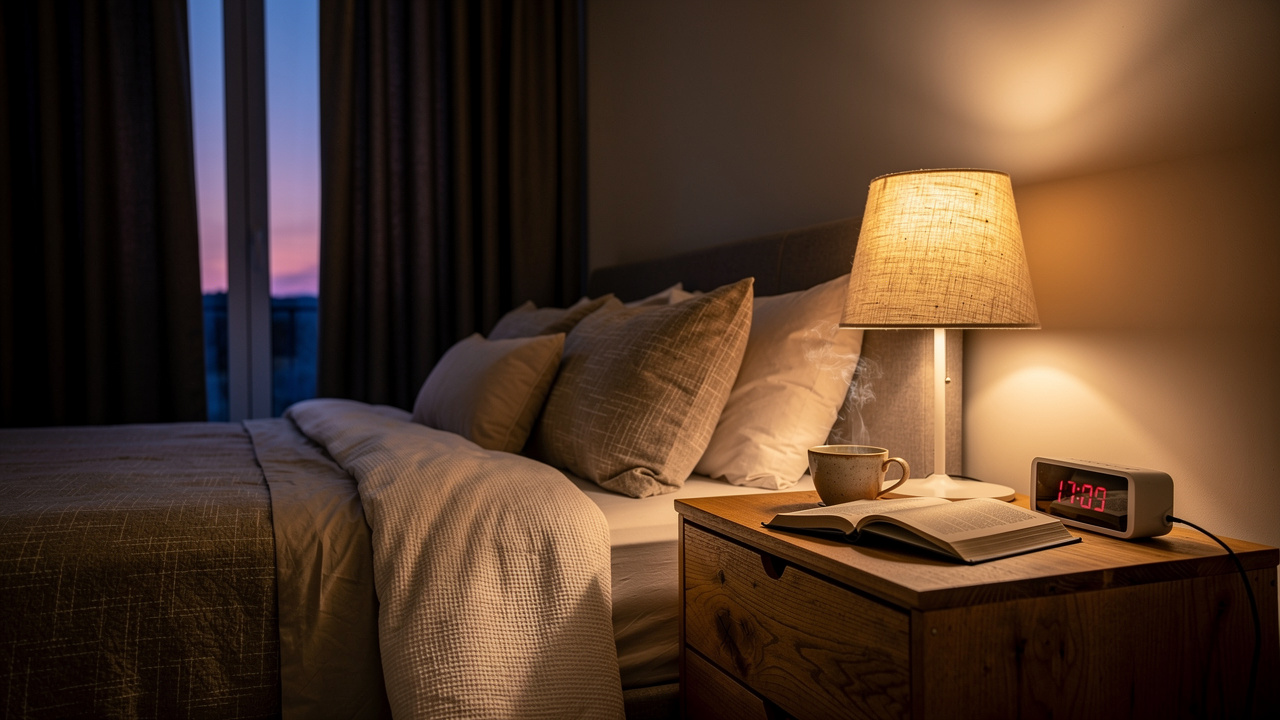If you have ever stared at the ceiling at 2 a.m. wondering “is 20mg of melatonin too much?” you are not alone. High performers, biohackers, athletes, and exhausted professionals often push dose and frequency with supplements that feel harmless. Melatonin looks safe on the surface—over-the-counter, widely available, even in gummy form—but dose matters. Just because something is sold without a prescription does not mean any amount is okay.
For most adults, research-backed doses are in the 0.3–5 mg range. A standard upper limit used in many studies is 10 mg. That makes a 20 mg dose well beyond what most evidence supports and raises the risk of grogginess, hormonal disruption, and other side effects without better sleep.
This guide breaks down how melatonin works, what science says about dosing, why 20 mg is considered excessive, and what to do instead if you care about long-term brain health, performance, and longevity.
How Melatonin Actually Works In Your Brain

Melatonin is a hormone produced by the pineal gland in response to darkness. It does not “knock you out” like a sedative. Instead, it signals to your circadian system that it is nighttime and helps shift you into a state of quiet wakefulness that can drift into sleep.
Key points:
-
Light exposure (especially blue light) suppresses melatonin.
-
Levels rise in the evening, peak overnight, and fall toward morning.
-
It helps align your internal body clock with the 24-hour day.
Synthetic melatonin supplements are designed to mimic this signal. They can help in specific situations:
-
Delayed sleep phase (you cannot fall asleep until very late)
-
Jet lag and shift work
-
Short-term insomnia
-
Some neurological or developmental conditions (under medical care)
"Melatonin is less a sleeping pill and more a signal of darkness."
This is a common way sleep clinicians explain why it helps with timing, not brute-force sedation.
Because melatonin is a hormone, the right question is not just “will it help me sleep?” but “at what dose, for how long, and at what cost?” That is where “is 20mg of melatonin too much” becomes a real safety question.
Evidence-Based Melatonin Dosages

There is no official FDA-approved dosing guideline in the US, because melatonin is regulated as a dietary supplement. Still, decades of research and clinical practice have converged on clear ranges that work for most people.
Typical Dose Ranges By Age
|
Group |
Common Dose Range |
Notes |
|---|---|---|
|
Children Under 5 (Medically Supervised Only) |
1–2 mg |
Only under pediatric guidance; long-term data are limited. |
|
Children 6–12 |
1–3 mg |
Often used for sleep-onset issues with strict oversight. |
|
Teens And Adults |
1–5 mg |
Many people fall asleep faster in this range. |
|
Adults (Selected Cases, Under MD Care) |
Up to 10 mg |
Upper limit used in trials for specific disorders. |
|
Adults Over 65 |
1–3 mg |
Lower doses often work better due to slower metabolism. |
Core principles that matter more than any single number:
-
Start low. Many people respond to as little as 0.3–1 mg.
-
Go slow. Increase only if needed, and only in small steps.
-
Keep it short. Think weeks, not months or years, unless supervised.
At Synchronicity Health, this is why our formulations are intentionally low-dose. Our Sleep Powder uses just 1 mg per serving, and our Melatonin Nasal Spray delivers 0.1 mg—designed for people who want precision control instead of mega-dosing.
When you understand these ranges, asking “is 20mg of melatonin too much” is almost rhetorical: it is four to twenty times higher than what works for most adults.
Is 20mg Of Melatonin Too Much?
For the vast majority of healthy adults, yes—20 mg is too much melatonin.
Here is why:
-
It exceeds common research limits. Most clinical trials use 1–5 mg, with 10 mg at the high end for special cases. A 20 mg dose is double that upper boundary.
-
More is not better. Melatonin has a kind of “ceiling effect.” Once receptors are saturated, extra hormone does not improve sleep but does increase side effect risk.
-
It can distort your circadian rhythm. Very high doses can shift or blunt your internal clock, leading to grogginess, timing confusion, or even worse sleep.
If you are asking “is 20mg of melatonin too much for occasional insomnia,” the answer is still yes. Short-term problems respond best to lower doses used strategically around timing and light exposure, not brute-force hormone loading.
If you are taking 20 mg every night, it is time to reassess with a clinician. At that level, melatonin is no longer a simple sleep aid; it is a strong hormonal signal you are flooding your system with, night after night.
What Research Says About High-Dose Melatonin

Small studies looking at “high-dose” melatonin (above 10 mg) consistently show:
-
Higher rates of headaches
-
Dizziness and next-day drowsiness
-
More vivid dreams and nightmares
-
Paradoxical worsening of insomnia in some people
Safety of higher doses of melatonin in adults has been examined through systematic review and meta-analysis, revealing no clear evidence that 20 mg improves sleep quality compared with 1–5 mg, yet the adverse effect profile grows significantly. For high performers who care about reaction time, decision-making, and recovery, that is a poor trade-off.
If your goal is longevity, brain health, or better performance, repeatedly asking yourself “is 20mg of melatonin too much” while taking it nightly is a sign to pull back, not push harder.
Side Effects And Signs You Took Too Much

Even at standard doses, some people feel melatonin quite strongly. At 20 mg, the odds of unpleasant symptoms go up sharply.
Common Side Effects (Even At Normal Doses)
-
Morning grogginess or “melatonin hangover”
-
Headaches
-
Dizziness
-
Nausea
-
Vivid dreams or nightmares
(If you are curious about the nightmare link, see our article on melatonin and dreams.)
Signs Your Dose May Be Too High
These are more likely if you are near or at 20 mg:
-
Persistent daytime fatigue and lethargy
-
Irritability, low mood, or anxiety
-
Abdominal cramps or stomach discomfort
-
Mild tremors
-
Low blood pressure, feeling faint, or “washed out”
Potential Symptoms Of A Melatonin Overdose
Melatonin is unlikely to be fatal, even at high doses, but an overdose can be very uncomfortable and disruptive:
-
Severe or persistent headaches
-
Intense confusion or disorientation
-
Very low body temperature (feeling unusually cold)
-
Rapid heart rate with palpitations
-
Worsened insomnia despite feeling tired
-
Bedwetting or urinary incontinence (especially in children)
-
Visual changes or a sense that your vision is “off”
-
Unexplainable blood in urine (seek urgent care)
If you accidentally took 20 mg or more and feel severely unwell—chest pain, extreme confusion, collapsing—call emergency services. Otherwise, stop the supplement, stay hydrated, avoid driving, and allow 4–5 hours for levels to drop.
The Hidden Risk: Unregulated Doses In Supplements
Another reason “is 20mg of melatonin too much” is a tricky question: the label may not match reality.
Because melatonin is sold as a dietary supplement in the US:
-
There are no standardized, FDA-approved doses.
-
Products do not undergo the same pre-market testing as prescription drugs.
-
Independent analyses show massive discrepancies between label claims and actual content.
Studies have found:
-
Some products contain 83% less to 478% more melatonin than stated.
-
Lot-to-lot variability can be as high as 465% within the same brand.
-
Some supplements contain unlisted substances such as serotonin or CBD.
This means your “10 mg” tablet could behave like 4 mg—or 20 mg+. For a hormone, that is not a trivial margin of error, especially in kids or smaller adults.
Practical tips when choosing a melatonin product:
-
Look for third-party testing (for example, NSF, USP, or similar marks).
-
Prefer lower-dose products so you can take more if needed, rather than being stuck with a mega-dose.
-
Avoid combining melatonin products (like gummies plus capsules) unless your clinician has advised it.
This is why ultra-low-dose formats, like our 0.1 mg Melatonin Nasal Spray, matter: they give you room to titrate instead of guessing whether your “20 mg” is actually 10 or 30.
Who Should Be Extra Careful With Melatonin
There are groups for whom the answer to “is 20mg of melatonin too much” is an immediate yes—and even low doses require medical supervision.
Use caution or avoid melatonin if you:
-
Are pregnant or breastfeeding
-
Have an auto immune disease (e.g., lupus, rheumatoid arthritis)
-
Have a seizure disorder or epilepsy
-
Live with depression, bipolar disorder, or severe anxiety
-
Have diabetes or impaired glucose control
-
Have hypertension, especially if on blood pressure medications
-
Are concerned about male fertility (some data link long-term use with reduced semen quality)
Children should never receive 20 mg. Pediatric dosing must be low, short-term, and guided by a pediatrician. Older adults on multiple medications should also check with their prescriber before adding even small doses.
Key Drug Interactions To Know About
High-dose melatonin (including 20 mg) can interact with common medications and magnify risks:
-
Blood thinners (warfarin, some antiplatelets): Increased bleeding risk.
-
Sedatives and sleep medications (benzodiazepines, “Z-drugs” like zolpidem, first-generation antihistamines): Excessive sedation and impaired coordination.
-
Blood pressure drugs: Melatonin can worsen control in some people.
-
Diabetes medications: Can alter blood glucose regulation.
-
Anticonvulsants: May reduce seizure control.
-
Oral contraceptives: May increase melatonin levels and side effects.
-
NSAIDs (e.g., ibuprofen): Can blunt natural melatonin production.
If you are stacking melatonin with prescription sleep aids, alcohol, or recreational sedatives and wondering “is 20mg of melatonin too much on top of this,” that combination is especially risky. Always run your full supplement and medication list by a healthcare professional.
Smarter Sleep Strategies Than Mega-Dosing Melatonin

If low-dose melatonin with theanine is not “working,” the answer is rarely to jump straight to 20 mg. For most high performers, the bottleneck is behavior and timing, not a hormone deficit.
As many sleep clinicians say, "You can't supplement your way out of poor sleep habits."
1. Dial In Sleep Hygiene
Foundational but non-negotiable:
-
Fixed wake time, seven days a week
-
No caffeine after early afternoon
-
No heavy meals or alcohol close to bedtime
-
Screen dimming and blue-light reduction 1–2 hours before bed
-
Dark, cool, quiet bedroom (low- to mid-60s °F)
-
Consistent pre-bed routine that helps you wind down
2. Use Melatonin Strategically
Adjust timing and dose to match your goal:
-
For sleep onset:
0.3–3 mg, about 30–60 minutes before bed -
For shifting your clock earlier:
Very low dose, taken 3–4 hours before desired bedtime -
For jet lag:
0.5–2 mg pre-flight, then 2–5 mg at local bedtime for a few days
Short bursts, low doses, and clear objectives beat a chronic nightly 20 mg habit almost every time.
3. Consider Non-Hormonal Supports
Trouble winding down despite good habits?
-
Cognitive Behavioral Therapy for Insomnia (CBT-I)
-
Relaxation techniques (breathwork, progressive muscle relaxation, meditation)
-
Certain botanicals (valerian, chamomile, lavender) under professional guidance
-
Temperature manipulation (hot shower before bed followed by a cool room)
-
Light management: bright light soon after waking, dimmer light as evening progresses
These can pair well with low-dose melatonin instead of forcing you to ask “is 20mg of melatonin too much for what I’m trying to fix?”
Melatonin Use For High Performers, Athletes, And Longevity Seekers
If you are deep into biohacking, NAD+ IVs, or aggressive recovery protocols, it is tempting to treat melatonin like another knob to turn all the way up. That mindset backfires with hormones.
For this group:
-
Protect next-day cognition. High-dose melatonin can impair reaction time and decision-making.
-
Protect hormonal balance. Long-term, high-dose use may affect reproductive hormones and other endocrine pathways.
-
Protect sleep architecture. Overshooting your dose can distort normal sleep stages, undermining the recovery you are trying to improve.
A better play is precision:
-
Reserve melatonin for specific scenarios (jet lag, circadian shifting, short-term sleep onset issues).
-
Use very low doses and forms that allow fine-tuning, such as our 0.1 mg Melatonin Nasal Spray or 1 mg Sleep Powder.
-
Track metrics—HRV, reaction time, training performance, subjective alertness—and adjust dose down, not up, if you notice blunting or grogginess.
For serious longevity enthusiasts, the safer long-term question is less “is 20mg of melatonin too much” and more “what is the lowest dose that still gives me the circadian signal I want?”
When To Talk To A Professional
You should bring melatonin up with a healthcare professional if:
-
You feel you “need” it every night to sleep.
-
You are taking more than 5–10 mg, or still wondering whether 20 mg might be reasonable.
-
You have any of the conditions or medications listed above.
-
Your sleep is still poor despite supplements and good habits.
-
You snore loudly, wake up choking, or feel unrefreshed despite 7–9 hours in bed.
A clinician can:
-
Screen for sleep apnea, restless legs, depression, and other root causes
-
Review your full supplement and medication stack for interactions
-
Help you taper from high doses like 20 mg to a safer, more effective range
-
Suggest testing or referrals (for example, to a sleep specialist) if needed
Key Takeaways
-
For almost everyone, 20 mg of melatonin is too much—well beyond typical research-backed doses.
-
Most adults sleep better in the 1–5 mg range; 10 mg is a practical upper ceiling under medical supervision.
-
High doses raise the risk of grogginess, headaches, blood pressure changes, hormonal effects, and circadian disruption without better sleep.
-
Because supplement labels can be inaccurate, a “20 mg” tablet may not even contain 20 mg, adding more uncertainty.
-
Low, precise dosing—like 0.1 mg in our Melatonin Nasal Spray or 1 mg in Sleep Powder—lets you fine-tune your response instead of overwhelming your system.
-
If you are asking “is 20mg of melatonin too much” more than once, that is your signal to step back, lower the dose, and work with a professional on the real drivers of your sleep.




Leave a comment
All comments are moderated before being published.
This site is protected by hCaptcha and the hCaptcha Privacy Policy and Terms of Service apply.